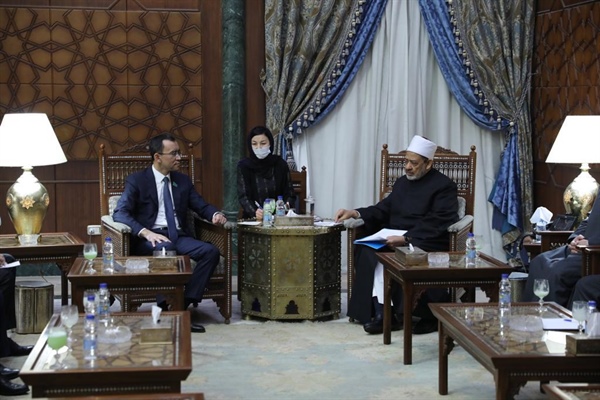Kazakhstan President invites Al-Azhar Grand Imam to visit his country, and inaugurate the Seventh Conference of Religious Leaders on the Role of Religious Leaders in the Post-Pandemic Period
Prof. Ahmad At-Tayyeb, the Grand Imam of Al-Azhar Ash-Sharif, received today, Monday at the headquarters of Al-Azhar, Dr. Mullen Ashimbayev, President of the Kazakh Senate, and his accompanying delegation to discuss ways of enhancing academic and cultural cooperation, training imams and combating extremism. At the beginning of the meeting, the President of the Kazakh Senate conveyed to His Eminence the greetings of President Kassym-Jomart Tokayev, the President of Kazakhstan, and his appreciation of the global role he has played in spreading the values of peace and coexistence as well as introducing the correct image of Islam. He also presented an official invitation from the Kazakh President to the Grand Imam to visit Kazakhstan and attend the opening of the Seventh Conference of Religious Leaders which will address “The Role of Religious Leaders in the Spiritual and Social Development of Humanity in the Post-Corona Pandemic” which will be held in the Kazakh city of Nursultan on December 14-15 this year.
At the beginning of the meeting, the President of the Kazakh Senate said, “I would like to express my great pleasure at visiting Your Eminence. It is a great honour to be in your presence and in this most important and inspiring place in the Muslim world. Egypt and Al-Azhar have provided a lot of support to Kazakhstan in order to promote Islam in our country”. He said, “Al-Azhar has played a leading role in this regard, as its graduates have also played the largest role in promoting moderate Islam. He added, “We are grateful for preparing Kazakh cadres and we are looking forward to your constant support and to having cooperation with your ancient institutions. We are still in dire need of Al-Azhar. We have eagerly followed your co-signing of the Document on Human Fraternity with Pope Francis which we consider to be a prelude to moving forward towards having interfaith dialogue, enhancing the culture of coexistence and peace”. He noted, “We are working to propagate for this important document within Kazakhstan because of its great importance in promoting intercultural dialogue. It is truly a unique document worldwide and Kazakhstan is ready to adopt serious initiatives on its dissemination and promotion locally and regionally”.
On his part, the Grand Imam welcomed the President of the Kazakh Senate and his accompanying delegation to Al-Azhar Ash-Sharif. He also expressed his appreciation for the person of the Kazakh President, noting his acceptance of his generous invitation to visit Kazakhstan. HE, stressed that he retains memories of this country after visiting it twice, noting that he is following up with the developments in this dear country calling upon Allah Almighty to guide its leaders and bestow upon its people constant safety and security. The Grand Imam affirmed Al-Azhar's readiness to provide Kazakhstan with the manpower and supplies it needs and to raise the number of Kazakh students who come to study at its ancient institutes and universities because of the great importance of this country. HE pointed out that “we sent a number of convoys of -Azhari teachers and preachers in Kazakhstan, and we welcome the imams of Kazakhstan to Al-Azhar International Academy for the Training of Imams and Preachers to improve their skills in interfaith communication, addressing contemporary problems and refuting the ideas of extremists”. HE also added that “we will design a curriculum on the most prominent challenges facing the Kazakh society and the ways such imams and preachers would address and discuss”.
The meeting also discussed ways of boosting cooperation between Kazakhstan and Al-Azhar Ash-Sharif in the fields of combating intellectual extremism, countering extremist groups, as well as Al-Azhar's leading role in confronting these ideas and groups and refuting their views, in addition to addressing women's rights in Islam, the negative effects of the Corona pandemic, and the need for joint efforts by states, non-governmental institutions and scholars in order to overcome this difficult stage.
